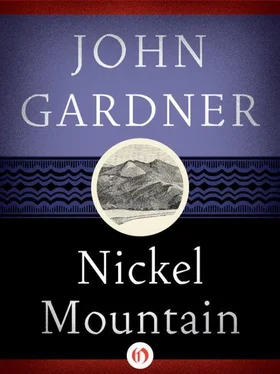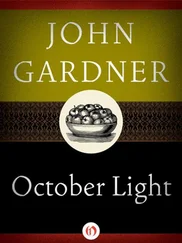Henry shrugged. “They don’t know yet. Could be thieves. Then again could be kids, or some tramp.”
“Jesus,” George said. He’d thought often of the possibility of thieves breaking in. He was not a worrier by nature, but it was a fact that he had a lot of good things in his house, some of them things that had been in the family for two hundred years — God only knew how much those might be worth — and some of them things he’d picked up himself from time to time, in junk shops up in Utica, at auctions here and there, in used book shops. Bill Kelsey had told him he should open a store.
(“You got more old stuff than any twenty people,” he’d said.
“There’s a lot of it, all right,” George had admitted, “and more in the other rooms; even some in the woodshed. I walled it up with insulation, so it’s dry.” He opened the door to what had been his mother’s bedroom and stepped back so Bill could look in.
“Christ in a crock,” Bill Kelsey said, “what’s all that?”
“National Geographics,” he said, grinning. “Whole file of them. The rolls in the corner are maps. Thirty-seven in all. Engraved.” There were various other magazines too— Linn’s Weekly Stamp News, Texas Gun Collector, American Rifleman.
“What in hell do you use them for?” Kelsey was amazed. Impressed, too, but mostly amazed. He stood tipped forward, looking, his thumbs hooked inside the bib of his overalls.
George had said ironically, closing the door again, “Use them for? Sometimes I go in and touch them,” and he winked. But it was true. It was the richest pleasure in his life, just picking them up, knowing they were his, safe from the destroyers who cut the woodcuts from great old editions like his illustrated Goethe, or saw down hand-crafted Kentucky pistols and weld on modern sights. In the pearwood breakfront he’d found at the Goodwill at Oneonta he had nine original Hohner mouth harps, in wooden cases as solemn and elegant as coffins. They’d cost plenty, once. Every stroke of the infinitely elaborate design was cut in by hand by some nearsighted old German silversmith, dead now for more than a century.
“Man, you’ll collect anything!” Bill Kelsey said.
George nodded, serious.
Bill Kelsey cocked his head, looking down at the newel post, saying, “I wonder if a person could get anything for that junk in my attic.”
“Could be,” George had said, excitement in his chest. “Why don’t we take a look sometime?”)
He set down the spoon with finality. “It must have been kids,” he said.
Henry opened his hands. Nobody knew.
It was a warm night, for May. He drove slowly, as always, his left foot riding the slack in the clutch, the ankle stiff in its metal brace. Fog lay white as snow in the valley bottom, the trees at the sides of the valley dark and gloomy. Here away from the lights of Henry’s house, no lights in sight but the stars and the moon and the flickering headlights of his own truck, the night seemed less dim than it had before. If he wanted to, he could drive with his headlights turned off. Might have to if that wire was to jiggle any looser. He ought to have fixed it weeks ago, but he’d put it off. He put off more and more, these days. The accident was eight, nine months ago now; according to Doc Cathey he was as fit as he was ever going to be, the remaining left arm grown unnaturally muscular, the wrist conspicuously larger now that it took the whole beating of stripping out the cows. He could do pretty much what he’d done before, if he wanted to. It just took him longer. But he’d lost his drive, the whole thing had made him older. He’d skipped the cultipacking this year — the disking had left the ground level enough, and the rain was pretty good, the ground would likely hold in enough moisture to get by. Lou Millet was putting in the soybeans for him — labor Lou owed him from two years ago — that would take care of seven acres, and the soil bank would take care of ten more. The alfalfa took care of itself. If the sky fell in he could live all right on the disability pension from the army. So he let things slide. He’d get up in the morning and milk the cows and clean up the barn, and after that he’d work for a couple of hours at the plowing, already so far behind schedule it didn’t much matter. (Corn knee high by the Fourth of July. He’d be lucky if he had the stuff planted.) Around noon he’d come in and quit till five-o’clock chore-time, spend his time pasting stamps in, or silver-polishing the two ceremonial Scottish swords (he’d gotten them both for seventy dollars), or just sitting in front of the television, half-asleep. Plowing had been a pleasure once — the smell of new-turned sillion, the blue-black sheen of the cut earth rolling off straight as an arrow, dark under the pines at the top of the hill, the ginger-water jug showing dull silver in the burdocks under the trees, the plowed ground richer and warmer where the sunlight struck. He’d be conscious of both the past and the future — riding sidesaddle on the tractor seat, one hand on the steering wheel, the other on the plow: He would remember intensely, as if still inside them, other springs, plowing with that same F-20 or riding the gas tank while his father plowed, rear end growling as if running on chains and the air sad-sweet with the scent of new buds and pinesap running and new-turned ground, and in the same flow of intense sensation he would see his crop growing and ripening, field corn towering over your head, the stalks oozing sweeter than honey when the blade bit through. Even after he’d come back from Korea, one foot smashed and his breathing bad from the mess-up in his chest, the plowing was good, he could handle it. But now it was changed. He plowed one-handed now, fighting the steering wheel left-handed, jerked off balance whenever the front wheels climbed over a rock, his right hand no longer there to anchor him; and when he saw a big rock coming at him he could no longer raise the plow on the run but had to throw in the clutch with his gimpy foot, reach back for the lever, and drive no-handed for a minute. More often than not, it seemed to him, he saw the rock coming in under too late, and before he could shove in the clutch he was hearing the crack of steel like a rifle shot and the point was gone, half the moldboard with it, and the plow was skidding along, one wheel in the air, like a crippled duck. One of these days, as sure as anything, he’d break the one fist he had left, hitting the tractor tire in his rage. The accident had left him hard-up as hell (let alone the way his picking things up was beginning to cost him), yet he’d seen no choice but to get a new plow, a trip-spring rubber-tired son-of-a-bitch the F-20 wasn’t horse enough to pull, which meant getting the big DC. They’d pretty near laughed in his face at the bank. But they’d loaned him the money, finally. Because the house was worth plenty, never mind the land. (“Business is business,” the man had said. He poked his moustache with his pen, feeling guilty. George Loomis had said, “Sometimes,” sarcastically, meaning that sometimes it was more, a way of staying alive; but he hadn’t bothered to explain what he meant, had merely signed where the man made the X with his ball-point pen.) If he ever did get the corn in the ground he’d need a new outfit to get it up into the silo. It was the fucking antique corn binder that had taken off his arm. (A long time ago, it seemed by now. A different life.)
It would be something, he thought then, walking into your house one night and finding a couple of nuts there, standing in the kitchen with big lead pipes, or pistols.
He turned up the dirt road that wound up Crow Mountain to his house. The lights were all off at the Shaffer place. Walt’s jeep was parked by the mailbox as usual, under the limbs of the beech tree, in case it should rain. The green and white plastic lawn furniture sat as always in the bare dirt yard among metal toy trucks and plastic blocks and pieces of dolls. The thought of their oldest girl, Mary Jean, passed briefly through his mind. He would see her bringing in eggs in a wire basket sometimes as he was driving past. She would wave, and he would wave back. She looked Polish, like her mother. Light brown hair, thick ankles. Somebody’d told him she had a cedar chest full of things for her marriage. Be too late pretty soon. She was getting close to her thirties now.
Читать дальше











